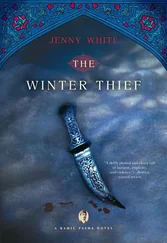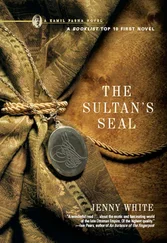Jenny White - The Abyssinian Proof
Здесь есть возможность читать онлайн «Jenny White - The Abyssinian Proof» весь текст электронной книги совершенно бесплатно (целиком полную версию без сокращений). В некоторых случаях можно слушать аудио, скачать через торрент в формате fb2 и присутствует краткое содержание. Жанр: Исторический детектив, на английском языке. Описание произведения, (предисловие) а так же отзывы посетителей доступны на портале библиотеки ЛибКат.
- Название:The Abyssinian Proof
- Автор:
- Жанр:
- Год:неизвестен
- ISBN:нет данных
- Рейтинг книги:4 / 5. Голосов: 1
-
Избранное:Добавить в избранное
- Отзывы:
-
Ваша оценка:
- 80
- 1
- 2
- 3
- 4
- 5
The Abyssinian Proof: краткое содержание, описание и аннотация
Предлагаем к чтению аннотацию, описание, краткое содержание или предисловие (зависит от того, что написал сам автор книги «The Abyssinian Proof»). Если вы не нашли необходимую информацию о книге — напишите в комментариях, мы постараемся отыскать её.
The Abyssinian Proof — читать онлайн бесплатно полную книгу (весь текст) целиком
Ниже представлен текст книги, разбитый по страницам. Система сохранения места последней прочитанной страницы, позволяет с удобством читать онлайн бесплатно книгу «The Abyssinian Proof», без необходимости каждый раз заново искать на чём Вы остановились. Поставьте закладку, и сможете в любой момент перейти на страницу, на которой закончили чтение.
Интервал:
Закладка:
2
Istanbul, 2 Teshrinievvel, 1303 Rumi (October 14, 1887)
Kamil Pasha woke with a start. As he got up from the armchair, papers cascaded from his lap onto the floor. He must have dozed off. The lamp was lit. The clock on the mantel said three in the morning.
His manservant, Yakup, stood in the doorway balancing a glass of tea on a tray. “No word yet.”
“What’s taking them so long?” Kamil complained as he picked up the files from the floor and stacked them on his desk. He stopped for a moment to examine a rose-colored bloom that had appeared on the potted Cephalanthera rubra sitting beside the files. It was one of dozens of orchids scattered about the rooms of his villa. A passionate collector, Kamil had had a winter garden built onto the back of the house for his more delicate varieties.
Kamil went next door to his bedroom. He poured water from a pitcher into a china bowl and stood for a moment, hands splayed on the cool marble of the washstand, frowning into the mirror. The lamplight accentuated the lean angles of his face and the tired smudges beneath his eyes. He looked like a ruffian with his unruly hair and mustache, black stubble, and dour expression. They say a man’s fate is written on his forehead, he reflected, examining the lines that scored his brow. Perhaps it was just a map of where that man has been. He smacked the flat of his hand against the marble and turned away. A map would imply the existence of a Mapmaker, he thought grimly. No God worth his salt would work with such flimsy materials.
Kamil dipped a tinned copper mug into a jar of spring water and drank it down, then went back to his study. He pushed open the window and leaned out. A slick of moonlight spread outward from the Beshiktash shore at the base of the hill. Beyond the strait hulked the black hills of Asia. The moon was high and the night too bright for subterfuge. Had their target spotted the gendarmes following him?
Kamil was a magistrate in the new secular courts, responsible for investigating and prosecuting crimes, especially those that could potentially undermine the state. He oversaw an area stretching from the Old City all the way north to the fishing villages and summer konaks of the wealthy nestled into the European side of the Bosphorus. These days, the mood in the city was as brittle as tinder. Muslim refugees from the embattled Balkan provinces had been teeming into the city, thousands of them with harrowed faces and tattered clothing, clogging the lanes with bullock carts, and bearing tales of massacres. The municipalities and charitable foundations were overwhelmed.
To make matters worse, valuable objects were disappearing at an alarming rate from mosques, churches, and synagogues throughout the empire. Two days ago, an icon of the Virgin Mary that the Christians believed had miraculous powers had disappeared from the Greek Orthodox Patriarchate. Christians and Jews had begun to accuse the sultan’s government of orchestrating the thefts in order to undermine their communities, as if the disappearing antiquities were phantom limbs and they feared in this way that they might vanish entirely.
Then, this afternoon, the spark had been struck that could set all of Istanbul aflame. A man had ridden up to a carriage that was carrying an aide to the Ottoman governor of Macedonia and, before the guards could react, had leaned inside and shot him in the head. The man had galloped off, but one of the guards followed and alerted the gendarmes, the military police attached to the governor’s office. That had set in motion an elaborate trap, the jaws of which were about to close around the assassin and his co-conspirators.
When news of the assassination spread, a crowd of Muslims, their numbers swelled by desperate refugees, had gathered outside the Aya Sofya Mosque, still revered by Christians as the Byzantine cathedral of Hagia Sophia, and threatened to burn it to the ground. They were met by an equal crowd of Christian men. In the resulting melee, ten people had been killed.
Kamil glanced at the message from the minister of justice lying on his desk. It appointed him special prosecutor charged with seeing that the entire situation be brought under control as quickly and as quietly as possible, and gave him full charge of the military operation.
The last thing the government wanted was to arrest Christians in broad daylight. Disguised military agents had followed the assassin to identify his co-conspirators, and those involved would be arrested at the same time, silently and efficiently, so none could warn the others. When the assassin had settled in for the night, Kamil would lead the gendarmes in extracting him from his lair. The man would be brought to the ministry and then disappear. For all the Christian community knew, he might have escaped abroad. Kamil preferred not to think about what would happen to him; the man had shot a government official and there would be justice.
As soon as the assassin was captured, Kamil would focus on the thefts, the tinder feeding the fear and resentment. It wouldn’t take much for the city to literally burn. If an angry mob torched a neighborhood and the fire spread, as it had many times before, it would engulf large parts of a city still mostly built of wood. He had confidence in the military police and didn’t wish to get in their way, so he was now forced to wait for their signal.
He got up and fetched the stack of files from his desk. The reports described missing gold and silver vessels, icons, illuminated manuscripts and books, massive silver candleholders, and even ancient tiles pried from the walls of mosques. He pulled out a drawing of the icon of the Virgin Mary, no larger than his hand, that was missing from the Patriarchate. The sketch showed Mary looking out calmly at the world, while the baby Jesus, his right hand slung around his mother’s neck, stared intently into her face as if willing her to do something. The theft of this icon had raised the level of tension more than any other as, he supposed, the Christians believed their divine protection had thereby been revoked.
The thefts appeared to be the work of an organized ring. Many of the objects appeared on the market in Europe, out of range of the Ottoman police, just weeks after being stolen, despite strict new antiquities laws and closer customs inspections. Kamil had spent the evening reading the reports, looking for a pattern. He despaired of the shoddy investigations carried out by the police. No systematic questioning of possible witnesses, no collection of more than the most rudimentary evidence. If the culprit hadn’t dropped a knife or a calling card at the scene, the police generally found nothing of interest.
The churches in Beyoglu, the foreigners’ section of Istanbul, belonged to the embassies and were well guarded. These thefts were from Istanbul’s Old City, a jumble of districts inhabited by Greeks, Jews, and Muslims. Especially hard hit were the neighborhoods of Fatih and Balat, a tangle of crumbling houses, gardens, tumbledown ruins, and small villas that extended along the banks of the Golden Horn up to the old Byzantine city walls.
Kamil knew who the recipients of the antiquities were-the same people in whose drawing rooms he had seen displayed Greek busts and sections of Roman friezes when he studied law and criminal procedure at Cambridge University in England four years ago. Europeans had fallen in love with some romantic image of the Orient, short of actually embracing its people. Really, it was more of a lust, Kamil thought, that required an unlimited parade of objects to satisfy. But who was stealing these objects and how were they getting to Europe? There was something deeply disturbing about these particular thefts, as if his own home had been violated.
Читать дальшеИнтервал:
Закладка:
Похожие книги на «The Abyssinian Proof»
Представляем Вашему вниманию похожие книги на «The Abyssinian Proof» списком для выбора. Мы отобрали схожую по названию и смыслу литературу в надежде предоставить читателям больше вариантов отыскать новые, интересные, ещё непрочитанные произведения.
Обсуждение, отзывы о книге «The Abyssinian Proof» и просто собственные мнения читателей. Оставьте ваши комментарии, напишите, что Вы думаете о произведении, его смысле или главных героях. Укажите что конкретно понравилось, а что нет, и почему Вы так считаете.












